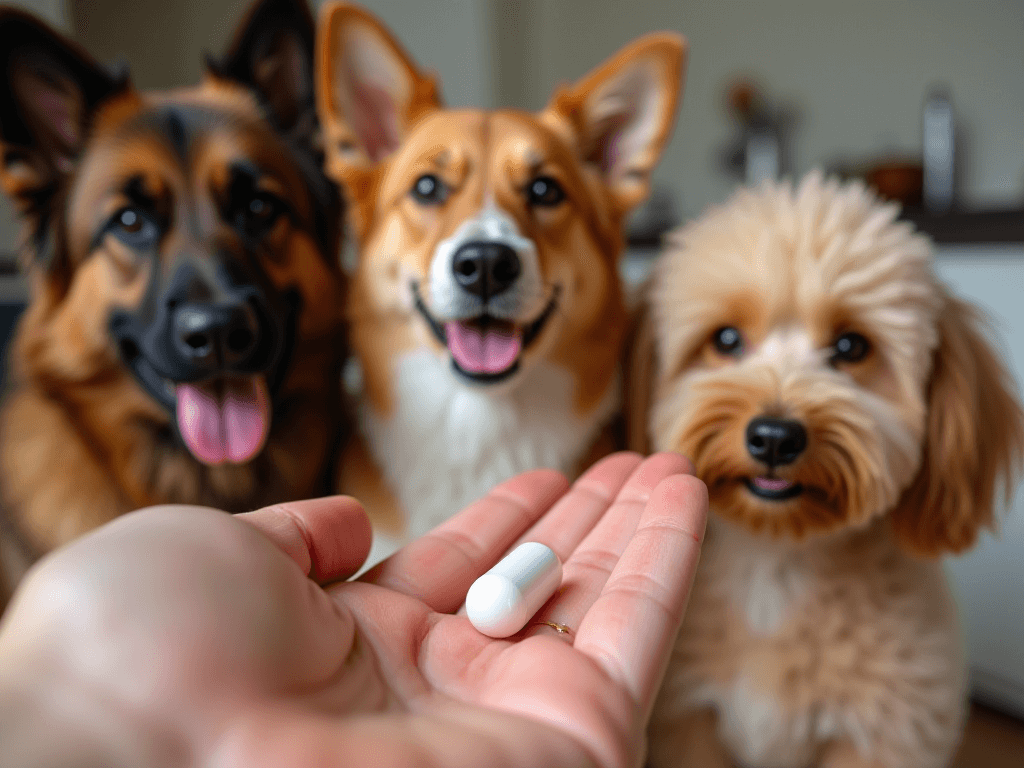When it comes to your dog’s gut health, prebiotics and probiotics play different yet complementary roles. Prebiotics act as food for the beneficial bacteria, while probiotics introduce those beneficial bacteria into the gut. Together, they help maintain a balanced digestive system, support immune health, and promote overall wellness.
Do Dogs Need Probiotics And Prebiotics?
Yes, dogs can benefit significantly from both probiotics and prebiotics. PetOptimum Probiotics for Dogs combines these natural supplements to work hand in hand, promoting healthy digestion, improving nutrient absorption, and supporting a strong immune system. They help balance the gut microbiome, which is crucial for overall health.
DON’T MISS: 10 Signs Your Dog Needs Probiotics (And Why You Should Act Now)
Prebiotic vs Probiotic For Dogs: What Is The Difference?
The main difference between prebiotics and probiotics for dogs is that prebiotics are a type of fiber that nourishes the existing good bacteria in your dog’s gut, while probiotics are live microorganisms that introduce new beneficial bacteria into the gut. Let’s dive deeper into each.
What Are Probiotics?
Probiotics are live microorganisms, mainly beneficial bacteria like Lactobacillus and Bifidobacterium, that reside in your dog’s gut. These bacteria help maintain a balanced digestive system by promoting healthy gut flora, particularly after disruptions caused by stress, illness, or antibiotic use.
Probiotics aid in the digestion of food, particularly by breaking down fiber, and they play a key role in the absorption of critical nutrients such as B vitamins (like B12 and folate) and vitamin K. These nutrients are vital for energy production, blood health, and overall well-being.
They also support the production of short-chain fatty acids (SCFAs) through fiber fermentation. SCFAs contribute to a healthy gut lining and overall digestive health.
In summary, probiotics restore gut balance, enhance digestion, improve nutrient absorption, and support your dog’s immune system.
CHECK OUT: Should I Give My Dog Probiotics Every Day?
So, Are Probiotics Good For Dogs?
Absolutely! Probiotics are good for dogs. They help maintain a healthy balance of gut bacteria, which is essential for digestion, vitamin and nutrient absorption, and immune function.
By promoting the growth of beneficial bacteria, probiotics can ease digestive issues such as diarrhea and bloating and are especially helpful after antibiotic use, which can disrupt gut flora.
In addition, probiotics support overall well-being by boosting your dog’s immune system and improving his gut environment, making them a great supplement to your dog’s diet.
Are Probiotics Safe For Dogs?
Yes, probiotics are generally safe for dogs and can be a beneficial part of their diet, particularly for those with digestive or immune system concerns.
Benefits Of Probiotics For Dogs
1. Supports healthy digestion
Probiotics help maintain a balanced gut microbiome, which is crucial for efficient digestion. They aid in breaking down food, especially fibers, ensuring your furry friends can absorb nutrients effectively and experience regular bowel movements.
RELATED: Is Pumpkin A Probiotic For Dogs?
2. Enhances nutrient absorption
By improving gut health, probiotics help the digestive system break down complex nutrients like B vitamins and vitamin K. This allows your dog to absorb these vital nutrients more efficiently, leading to better overall health and energy.
3. Helps manage diarrhea and constipation
Probiotics can restore gut balance, particularly during digestive upsets like diarrhea or constipation. They replenish good bacteria, which can help normalize stool consistency and ease gastrointestinal discomfort.
4. Boosts immune system function
A significant portion of your dog’s immune system is linked to gut health. Probiotics support the immune system by maintaining a healthy gut barrier, reducing inflammation, and protecting against harmful pathogens.
5. Reduces bloating and gas
Probiotics help in breaking down food and managing bacteria that can cause excessive gas and bloating. This leads to a more comfortable digestive process, especially for dogs with sensitive stomachs.
What Are Prebiotics?
Prebiotics are indigestible fibers that feed the good bacteria in your dog’s gut. They work alongside probiotics to maintain a balanced microbiome, which is essential for your dog’s health.
What Is The Best Prebiotic For Dogs?
The best prebiotic for dogs is one that promotes the growth of beneficial bacteria in the gut, supports digestion, and enhances overall health.
Fructooligosaccharides (FOS) is widely regarded as one of the most effective prebiotics for dogs. FOS works by selectively feeding the good bacteria, such as Bifidobacterium and Lactobacillus, without nourishing harmful bacteria. This promotes a balanced gut microbiome, which is crucial for your dog’s digestive health and immune support.
Inulin is another excellent prebiotic that fosters the growth of beneficial bacteria and aids in digestive regularity. Found naturally in foods like chicory root and dandelion greens, inulin helps promote a healthy gut environment and complements the function of probiotics.
For a complete digestive solution, PetOptimum Probiotic For Dogs provides both prebiotics and probiotics. Our product is specially formulated with prebiotics like FOS, paired with powerful probiotic strains, to ensure your dog’s digestive system remains balanced and healthy.
Benefits Of Prebiotics For Dogs
1. Nourishes Beneficial Bacteria
Prebiotics act as food for the beneficial bacteria already present in your dog’s gut, helping them flourish. This ensures that the good bacteria outnumber the harmful ones, promoting a balanced and healthy gut microbiome.
2. Improves Digestive Regularity
Prebiotics help ensure smooth and consistent bowel movements by feeding good bacteria. This can prevent issues like constipation and support more regular digestion.
3. Strengthens the Gut Lining
Prebiotics promote the production of short-chain fatty acids (SCFAs), which strengthen the gut lining. A stronger gut lining helps block toxins and harmful substances from entering your dog’s system.
4. Supports Nutrient Breakdown
Prebiotics aid in breaking down complex fibers that dogs might otherwise struggle to digest. This improves the bioavailability of essential nutrients, helping your dog absorb more from their food.
5. Reduces Inflammation
By fostering the growth of anti-inflammatory bacteria, prebiotics help reduce inflammation in the digestive tract. This is particularly beneficial for dogs with sensitive stomachs or conditions like inflammatory bowel disease (IBD).
You might also like: Do Probiotics Help Dogs With Itching?
Do Dogs Need Prebiotics?
Yes, prebiotics are essential for maintaining a healthy balance of bacteria in your dog’s gut. Without prebiotics, probiotics may not thrive, limiting their effectiveness.
5 Reasons Why Dogs Need Prebiotics:
- Supports gut health: Prebiotics nourish the good bacteria, ensuring a balanced digestive system.
- Improves digestion: By feeding beneficial bacteria, prebiotics can help improve digestion and nutrient absorption.
- Boosts immune function: A healthy gut is closely linked to a strong immune system. Prebiotics help maintain that balance.
- Reduces digestive discomfort: Dogs with sensitive stomachs may experience fewer issues with gas or bloating when taking prebiotics.
- Helps with weight management: By supporting digestion, prebiotics can help maintain a healthy weight in dogs.
Synbiotic For Dogs: How Do Prebiotics And Probiotics Work Together?
Prebiotics and probiotics form a powerful combination known as synbiotics, working together to optimize your dog’s gut health.
Prebiotics act as fuel, feeding the beneficial bacteria (probiotics) in your dog’s digestive system. This creates an ideal environment for probiotics to thrive, ensuring they can effectively balance gut flora, improve digestion, and enhance nutrient absorption.
Together, prebiotics and probiotics maintain a healthy microbiome, promoting overall digestive health and immunity for your canine friends, making synbiotics an essential part of a well-rounded supplement routine.
Why Are Prebiotics And Probiotics Found Together In Dog Supplements?
- Prebiotics and Probiotics work synergistically for better digestion.
- Probiotics and Prebiotics together support a balanced microbiome.
- Dog Supplements containing both improve nutrient absorption.
- Prebiotics and Probiotics help boost immune health.
- Probiotics and Prebiotics promote healthy skin and coat.
- Prebiotics and Probiotics reduce digestive discomfort like gas and bloating.
- Dog supplements with both pre and probiotics ensure optimal gut health.
When Should You Use Prebiotic And Probiotic For Dogs?
- After a course of antibiotics, your dog’s gut may lose beneficial bacteria, which probiotics can help replenish to restore balance.
- If your pup experiences digestive upset like diarrhea or bloating, prebiotics and probiotics can help soothe the stomach and promote recovery.
- As dogs age, their gut health may decline, making probiotics helpful for digestion and nutrient absorption.
- For maintaining a healthy microbiome, taking prebiotics and probiotics regularly supports digestive and immune health.
- If your dog’s immune system needs extra support, probiotics can help by promoting a balanced gut.
- After illness, your furry friend’s gut may become imbalanced. Adding probiotics can help restore the beneficial bacteria lost during recovery.
- If your dog is experiencing stress, prebiotics and probiotics can help maintain a healthy gut, reducing the likelihood of digestive issues caused by anxiety or changes in routine.
- If your K9 friends struggle with allergies or itchy skin, probiotics can help improve the gut’s response, reducing inflammation and skin irritation.
- For dogs suffering from yeast infections, probiotics can help restore a healthy balance of bacteria, preventing the overgrowth of harmful yeast in the gut and on the skin.
Natural Sources Of Prebiotics For Dogs
Natural prebiotics can be found in many everyday foods that are safe for dogs to consume including:
- Oats contain beta-glucan, a prebiotic fiber that supports the growth of beneficial gut bacteria, improving digestion and bowel regularity.
- Sweet potatoes are packed with fiber, they fuel good bacteria in the digestive system and provide vital nutrients like vitamins A and C.
- Bananas are rich in resistant starch, a prebiotic fiber that helps grow beneficial bacteria while offering potassium for overall health.
- Chicory root is high in inulin, it feeds the good bacteria, promoting a balanced gut microbiome.
- Apples (with skin on): The pectin in apples serves as a prebiotic, encouraging the growth of beneficial gut bacteria. Additionally, the fiber found in the skin contributes to digestive health by promoting regular bowel movements and supporting a healthy gut microbiome.
- Barley also contains beta-glucan, encouraging the growth of good bacteria and enhancing digestive health.
- Carrots provide fiber to support gut bacteria and are rich in vitamins A and C for immune and skin health.
- Asparagus is also high in inulin, it supports beneficial gut bacteria and delivers antioxidants for overall wellness.
- Flaxseeds are loaded with fiber, flaxseeds support the growth of healthy gut bacteria while also offering omega-3 fatty acids.
- Dandelion greens are also rich in fiber, these greens nourish beneficial bacteria and provide calcium, iron, and potassium for added health benefits.
Incorporating Natural Prebiotics And Probiotics For Dogs
Incorporating natural prebiotics and probiotics into your dog’s diet can be a fantastic way to boost their gut health. Start by gradually introducing new foods to provide a balanced, fiber-rich diet that feeds the good bacteria.
However, ensure moderation to avoid overloading their system with too much fiber, which could lead to digestive upset.
How Do Natural Prebiotics Compare To Prebiotics Supplements For Dogs?
Natural prebiotics are undoubtedly beneficial, but relying solely on them can be challenging for dog owners to ensure their pets are getting the right daily amount.
Prebiotic supplements, such as PetOptimum Probiotic Chews for Dogs, provide consistency in measurement, eliminating the guesswork and guaranteeing that your dog receives the optimal dose for gut health.
These supplements are also far more time-efficient for busy owners, saving them from calculating food sources and quantities.
The ease of use makes supplements a reliable, hassle-free option, ensuring your dog’s digestive health is consistently supported without daily uncertainties.
Can A Dog Take Human Probiotics?
While dogs can take human probiotics, it’s recommended to choose probiotics formulated specifically for dogs to meet their unique digestive needs.
Read more here: Can Dogs Take Human Probiotics?
How To Find The Best Prebiotic And Probiotic Supplement For Dogs:
1. NASC Certification
Look for the National Animal Supplement Council (NASC) quality seal to ensure high manufacturing standards and safety for your dog.
2. Manufactured in a cGMP Facility
Look for a supplement that is manufactured in a cGMP (Current Good Manufacturing Practices) facility. This ensures that the product is produced under strict quality control standards, guaranteeing safety, consistency, and purity throughout the manufacturing process.
A cGMP-certified facility follows rigorous guidelines set by regulatory agencies, providing an extra layer of assurance that the supplement meets high standards for your dog’s health and safety.
3. Veterinarian Formulated
Choose a product that is formulated or approved by veterinarians to ensure it’s designed for the specific needs of dogs.
4. Strain Diversity
Choose a supplement with multiple strains of beneficial bacteria to support different aspects of your dog’s digestive and immune health.
Strains such as Lactobacillus acidophilus help improve digestion and nutrient absorption, while Bifidobacterium bifidum balances gut flora and boosts immunity.
Lactobacillus rhamnosus is particularly effective for managing diarrhea and promoting gastrointestinal health.
Additionally, Enterococcus faecium supports overall gut function, helping to combat digestive upset. A well-rounded supplement with these strains will enhance gut health and provide broader immune support.
5. Prebiotic Content
Ensure the supplement contains effective prebiotics, such as inulin or fructooligosaccharides (FOS), to feed good bacteria in the gut.
6. Prebiotic and Probiotic Combo
Opt for products that combine prebiotics and probiotics, as prebiotics nourish the probiotics and enhance their effectiveness.
7. Natural Ingredients
Select supplements that use natural, high-quality or premium ingredients for purity and safety. It’s a good idea to ask your veterinarian to review the ingredient list to ensure it aligns with your dog’s specific health needs. A vet can provide valuable insights into which natural ingredients are best for your dog and help you avoid any potential allergens or harmful additives.
RELATED: Do Probiotics Help Dogs With Allergies?
8. High CFU Count
Colony-Forming Units (CFUs) represent the number of live and active bacteria in a probiotic supplement. For dogs, a CFU count between 1 billion and 10 billion per serving is recommended to ensure an adequate amount of beneficial bacteria for supporting digestive and immune health.
This range helps probiotics effectively populate the gut, improve digestion, and maintain a healthy microbiome, while being gentle and safe for your dog’s digestive system.
9. Easy-to-Administer Forms
Consider supplements in chewable, powder, or capsule form that are easy to give and well-tolerated by your furry friends.
10. Transparent Labeling
Select a supplement with clear labeling of ingredients and dosages, so you know exactly what your dog is consuming.
How Long Does It Take For Prebiotics And Probiotics To Work In Dogs?
The effects of prebiotics and probiotics can start to show within a few days, but for more significant health benefits, it may take a few weeks of consistent use.
Final Thoughts: Probiotics And Prebiotics For Dogs
Both prebiotics and probiotics are vital for your dog’s health. Incorporating them into your dog’s diet, either through food or supplements, can promote a healthy gut, boost the immune system, and contribute to a long, happy life.






